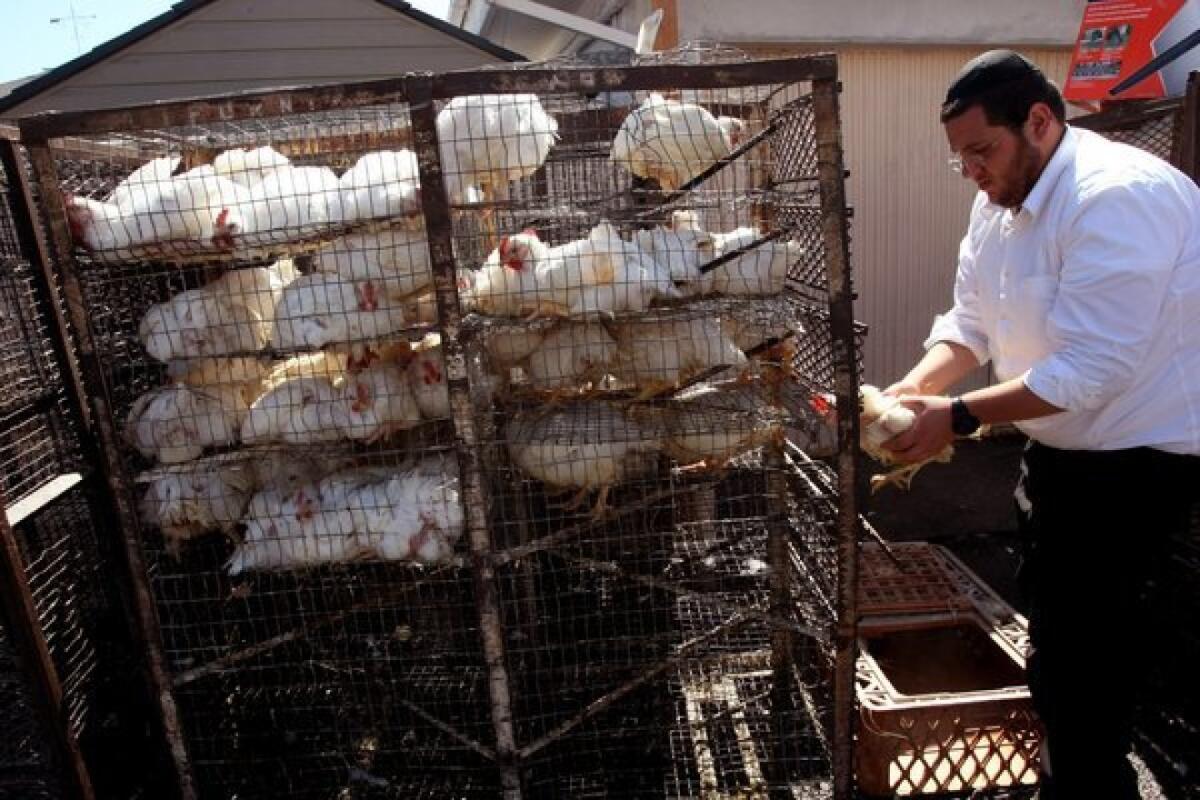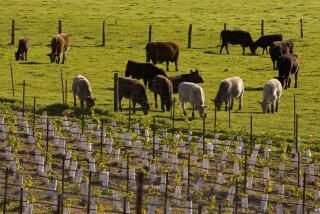Jewish center sued over controversial chicken-killing ritual

On a September day last year, between the Jewish High Holy Days of Rosh Hashanah and Yom Kippur, a group of worshipers gathered in a parking lot at the Woodland Hills Hebrew Discovery Center for a religious ritual called kapparot.
Behind tarps and makeshift structures used to shield the proceedings from view, live chickens were swung overhead by their feet or wings as a rabbi chanted a prayer. The animals are meant to symbolically absorb the sins of the practitioners, and following the ceremony, the chickens’ throats are slit.
In the Jewish tradition, the slain chickens are meant to be given to the poor to eat, but an animal rights group says that’s not what happened, according to a lawsuit filed this month in Los Angeles Superior Court.
The Animal Protection and Rescue League alleges that Rabbi Netanel Louie killed and discarded the chickens without using them for food, violating an animal rights law that bars maliciously and intentionally mutilating, torturing or wounding animals.
The group is seeking an injunction against the Hebrew Discovery Center forbidding the kapparot practice.
“This isn’t about targeting any one religion,” said Bryan Pease, the attorney representing the animal rights group. “They are throwing the chickens into the trash.”
Louie declined to comment on the pending litigation.
Protests and legal action against synagogues practicing the controversial kapparot tradition, also known as kaparot and kaparos, have increased in recent years, though the actual practice is less common than it was a century ago, said Jonathan Klein, a rabbi who founded Faith Action for Animals, another animal rights group.
“As a rabbi in the community, I disagree this is good,” said Klein, noting that the tradition is now practiced mostly by Orthodox communities. “I think it ... hurts the Jewish community. Violence begets violence.”
Animal rights activists — many of them Jewish — agree the tradition is outdated and cruel, but stopping the practice have been a challenge, Pease said. In 2013, Klein organized large protests in the Pico-Robertson area, where the rabbi says the tradition is prevalent. Since then, the practice hasn’t ended, but faith leaders seem to have taken the ritual inside private homes, he said.
An Irvine synagogue has been sued several times since 2015 in connection with kapparot. Temporary restraining orders were issued but then lifted in October 2016, days before Yom Kippur, when the ritual is traditionally practiced.
In a 2017 lawsuit, Pease argued that in practicing kapparot and charging people for the service of killing chickens, the Chabad of Irvine violated California’s unfair competition law. A Superior Court judge rejected that suit, saying the practice wasn’t a business act but a religious rite, the Orange County Register reported.
Pease has since changed his legal tack. Regardless of animal cruelty allegations, he said, kapparot is illegal because synagogues don’t dispose of the chickens properly and aren’t using the animals for consumption.
In the latest lawsuit, the Animal Protection and Rescue League also alleges that its 1st Amendment rights were violated by Los Angeles police during a protest at the Woodland Hills synagogue last year.
While leading a group of chanting protesters, one man was threatened with arrest if he didn’t keep his voice down, the lawsuit states. In contrast, the Hebrew Discovery Center blared loud music, masking the sound of the traumatized crying chickens, court records show.
An LAPD officer physically grabbed another protester, taking her into a nearby alley and threatening to arrest her for using a megaphone, according to the lawsuit. Pease said kapparot participants used some type of liquid to spray protesters over a fence that divided them.
Klein, who participated in last year’s protests, said he thinks law enforcement is giving rabbis practicing kapparot special treatment because of the rite’s religious nature.
“There were ways in which the city of Los Angeles enabled this ritual to go forward,” he said. “LAPD was squarely in the pocket of the religious community there, [and that is] fundamentally problematic.”
Klein said even if kapparot is protected as a religious practice, the treatment of the animals before, during and after the ceremony should be humane.
“If you have the right to eat beef, that doesn’t mean you have the right to beat up a cow before you slaughter it.”
More to Read
Start your day right
Sign up for Essential California for news, features and recommendations from the L.A. Times and beyond in your inbox six days a week.
You may occasionally receive promotional content from the Los Angeles Times.







